Home Tags Posts tagged with "turkey protests"
turkey protests
Turkey’s PM Recep Tayyip Erdogan has said 15-year-old Berkin Elvan who died on Tuesday from injuries sustained in last year’s anti-government protests had links to terrorism.
Berkin Elvan spent nine months in a coma after being hit by a tear gas canister as he went to buy bread.
His death triggered more clashes with the police in over 30 towns and cities.
Recep Tayyip Erdogan’s comments could further inflame political tensions, correspondents say.
In a campaign speech ahead of local elections on March 30, Recep Tayyip Erdogan said the teenager was connected to “terrorist organizations”.

Recep Tayyip Erdogan has said 15-year-old Berkin Elvan had links to terrorism
“This kid with steel marbles in his pockets, with a slingshot in his hand, his face covered with a scarf, who had been taken up into terror organizations, was unfortunately subjected to pepper gas,” he said in the speech broadcast on state TV.
Berkin Elvan’s funeral took place in Istanbul on Wednesday, providing a focus for further expressions of discontent with Recep Tayyip Erdogan.
Police fired water cannon and tear gas at protesters near Taksim Square, while his coffin was carried through the city’s streets.
Tens of thousands of mourners chanted anti-government slogans and Berkin Elvan’s mother accused Recep Tayyip Erdogan of killing her son.
Berkin Elvan’s death brought to at least eight the toll from last year’s unrest, including one policeman.
The protests began over plans to develop Istanbul’s Gezi Park into a new mosque and shopping centre, but escalated into national demonstrations against what opponents see as Recep Tayyip Erdogan’s growing authoritarianism.
[youtube -PHd36cOkms 650]
The funeral of Berkin Elvan – a teenage boy injured during Istanbul anti-government protests last year – has gathered tens of thousands of people on the streets of Turkey’s biggest city.
Berkin Elvan, 15, spent 269 days in a coma before his death on Tuesday.
Many of the protesters echoed his mother’s claim that Turkish PM Recep Tayyip Erdogan was Berkin’s “killer”.
Police in the capital Ankara fired tear gas to disperse several thousand protesters who had gathered in the central Kizilay square.
Berkin Elvan was 14 when he was struck on the head by a tear gas canister while going to buy bread during last year’s unrest.
“Berkin’s murderers are the AKP police,” protesters shouted in Istanbul, referring to PM Recep Tayyip Erdogan’s ruling Justice and Development Party (AKP).
The crowds, shouting anti-government slogans, lit a huge fire as they made their way to a cemetery for the burial of the teenager.
“The rage of mothers will suffocate the killers,” screamed others.
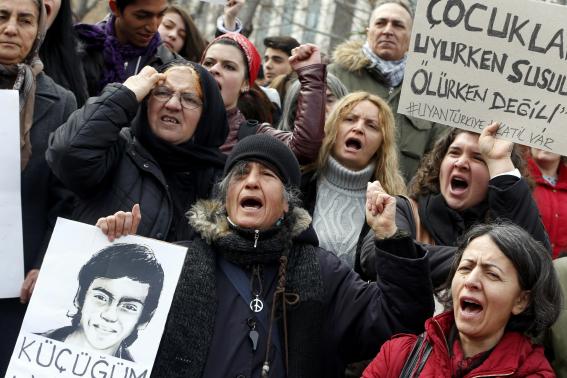
Tens of thousands of people have marched through Istanbul for Berkin Elvan’s funeral (photo Reuters)
Berkin Elvan’s death triggered violent protests in at least 32 towns and cities across the country on Tuesday – reminiscent of last year’s unrest.
President Abdullah Gul expressed his sadness and appealed for calm, urging everyone “to do everything to prevent this from happening again”.
He said Turkey was going through difficult days and that the “mind of the state has become overwhelmed by anger and hatred.”
The president added: “Little 15-year-old Berkin Elvan is the latest victim of this atmosphere.”
Correspondents say Berkin Elvan became a symbol of the heavy-handed tactics used by police to rein in the biggest demonstrations against the prime minister.
His death brought the toll from last year’s unrest to at least eight, including one policeman.
Berkin’s mother, Gulsum Elvan, had challenged Recep Tayyip Erdogan, who praised police “heroism” during the protests.
“It’s not God who took my son away but prime minister Erdogan,” the tearful mother told reporters on Tuesday.
The renewed unrest is likely to add to pressure on Recep Tayyip Erdogan, whose government has been rocked by an escalating corruption scandal ahead of elections that could decide his fate.
[youtube DiHEI2ykx3U 650]
Gezi Park protesters have clashed with Turkish police in Istanbul, after riot squads used tear gas and water cannon to eject demonstrators from the park.
The protesters quickly fled the park, but later erected barricades across nearby streets and lit bonfires.
Witnesses said it was one of the worst nights of unrest since the park was occupied 18 days ago.
Police blocked off the Bosphorus Bridge to stop demonstrators reaching Taksim Square, where the park is located.
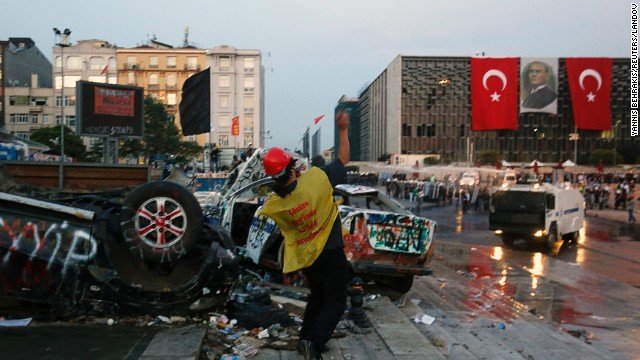
Gezi Park protesters have clashed with Turkish police in Istanbul, after riot squads used tear gas and water cannon to eject demonstrators from the park.
Clashes continued into Sunday morning in the streets around the square, eyewitnesses say. On the square itself, bulldozers went to work, clearing away the protesters’ abandoned barricades.
Thousands of people also took to the streets of the capital, Ankara, to express support for the protests.
The Confederation of Public Workers’ Unions (KESK) also said it would call a nationwide strike on Monday, while another union grouping is deciding whether to join the action.
Medical officials estimate that 5,000 people have been injured and at least four killed since protests began in earnest on May 31.
PM Recep Tayyip Erdogan is due to hold a rally in Istanbul later on Sunday.
The protests began as a local protest against a plan to redevelop Gezi Park, but snowballed into nationwide anti-government protests after the perceived high-handed response of the authorities.
[youtube F8rphu8nj1Y]
Turkey’s PM Recep Tayyip Erdogan has issued a “final warning” to protesters to leave Gezi Park in Istanbul.
“Our patience is at an end. I am making my warning for the last time,” he said.

Recep Tayyip Erdogan has issued a “final warning” to protesters to leave Gezi Park in Istanbul
Clashes between police and protesters in the park and adjoining Taksim Square have continued for nearly two weeks.
Activists have said they will not leave Gezi Park until the government abandons plans to redevelop it. Recep Tayyip Erdogan has promised a local vote on its future.
Such a plebiscite would not be legally binding but Recep Tayyip Erdogan implied he would honor its outcome.
“I say to the mothers and fathers please take your children in hand and bring them out,” Recep Tayyip Erdogan declared.
“We cannot wait any more because Gezi Park does not belong to occupying forces but to the people.”
Recep Tayyip Erdogan’s speech at a meeting of his ruling AK Party in the capital, Ankara, received a standing ovation.
[youtube ZpEvNGU1xjk]
[youtube Yy3OkrRWcVI]
The image of a woman in a red cotton summer dress with a white bag slung over her shoulder and a masked policeman firing noxious tear gas spray that sends her curly hair billowing upwards has become the symbol of the Turkish.
Endlessly shared on social media and recreated as artwork on posters and stickers, the image of the woman in red has become the leitmotif for female protesters during days of violent anti-government riots in Istanbul.
It has thrust Turkish academic Ceyda Sungar into the limelight but she says her experience is typical of people in her country who fight for their rights.
Ceyda Sungar, an academic in city planning at Istanbul Technical University, told Turkish newspaper Radikal: “Every citizen defending their urban rights, every worker defending their human rights, and every student defending university rights has witnessed the police violence I experience.”
Ceyda Sungar, who is part of the Taksim Solidarity Platform protesting against the redevelopment of Gezi Park, has since declined further interviews as she is believed to be uncomfortable with her position as the focal point of the movement.
But it has become a galvanizing force for fellow protestors.
“That photo encapsulates the essence of this protest,” says maths student Esra at Besiktas, near the Bosphorus strait – one of the many centres of this week’s protests.
“The violence of the police against peaceful protesters, people just trying to protect themselves and what they value.”
In one artist’s rendering which has been plastered on walls in Istanbul and elsewhere the woman appears much bigger than the policeman.
“The more you spray the bigger we get,” reads the slogan next to it.
The U.S. and the European Union as well as human rights groups have expressed concern about the heavy-handed action of Turkish police against protesters.
Turkish PM Tayyip Erdogan branded the protesters on Monday extremists “living arm in arm with terrorism”, a description that seems to sit ill with the image of the woman in red.
Deputy PM Bulent Arinc has apologized for police violence and was due to meet organizers of the demonstration against plans to build a replica Ottoman-era barracks on Istanbul’s Gezi Park in Taksim Square.
But he refuses to talk to unnamed groups he accuses of exploiting anger over police action against the original protest to foment broader violence.
He is in control of the government after Recep Tayyip Erdogan flew off to a state visit to North Africa on Monday.
Recep Tayyip Erdogan did not comment on domestic matters at a news conference in Algiers on Tuesday.
Bulent Arinc apologized for “excessive violence” by police against the initial Taksim demonstration, which contrasted sharply with Recep Tayyip Erdogan’s dismissal of the protesters as “looters” and comments linking some to “terrorism”.
President Abdullah Gul has also made markedly more restrained comments on the protests.
Pro-government newspapers signaled a softening of Ankara’s line today and the Sabeh newspaper’s front-page read “Olive Branch”.
Today thousands of people remained at a makeshift camp at Taksim, which has become a focal point of the demonstrations.
Small tents have appeared, food and face masks are on sale and a library is being created.
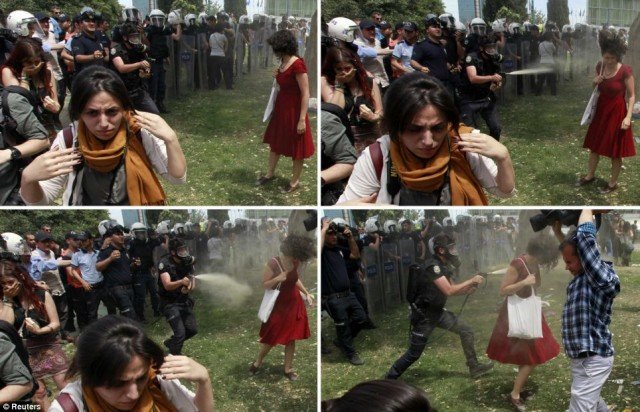
Ceyda Sungar, woman in red who becomes symbol of Turkish protests being doused with pepper spray, is an academic in city planning at Istanbul Technical University
British student Melisa Kenber, 19, said she was chased by police wielding tear gas canisters after she filmed the protests.
The Leeds University student from Ripon, North Yorkshire, was visiting family in Istanbul when she became caught up in the protests.
As she started to video the police they yelled: “No pictures, no pictures”, and ran after her until she reached her car, her eyes streaming from the gas.
Melisa Kenber said: “I go to Istanbul every year but this time I went, before it all kicked off, I had never hear people so frustrated and angry and complain about the government.
“It was like a bomb waiting to go off. The final straw was at Taksim Square.
“There were thousands of people there, listening to bands and talking, it was a really nice atmosphere.
“But just before dawn police arrived with canisters of gas and water bombs.”
Police have arrested 25 people for “spreading untrue information” on social media and provoking protests.
Turkish state-run news agency Anadolu Agency said today the people were detained in the city of Izmir for allegedly “inciting the people to enmity and hate”. It said police were still looking for 13 others.
Tens of thousands of Turks have joined anti-government protests expressing discontent with Recep Tayyip Erdogan’s 10-year rule.
Turkey’s main broadcast media have been criticized for shunning the coverage of police brutality at the protest onset on Friday. Many people turned to social media to keep up to date with the developments.
Recep Tayyip Erdogan, who has dismissed the protests as demonstrations organized by an extremist fringe, has referred to the social media as “the worst menace to society”.
Clashes spread overnight to the eastern province of Tunceli, where police fired tear gas and water cannon at hundreds of protesters who set up barricades and threw stones at them, witnesses said.
Police intervened in a similar way against demonstrators in the capital, Ankara, as well in Hatay province on the Syrian border where a 22-year-old man died after being hit in the head at a rally late on Monday.
The DISK union confederation, including unions in the metalworking, health and energy sectors, was due to stage a walkout on Wednesday, joining another labor confederation in a protest against the government.
Last night, some protestors dressed in more combative gear and sporting face masks as they threw stones, but the large number of very young women in Besiktas and on Taksim Square where the protests began on Friday evening is notable.
With swimming goggles and flimsy surgical masks against the teargas, light tasseled scarves hanging around their necks, Esra, Hasine and Secil stand apprehensively in the Besiktas district on Monday evening.
They are joined by ever growing numbers of youngsters as dusk falls and the mood grows more somber.
They belong, as perhaps does the woman in red, to the ranks of young, articulate women who believe they have something to lose in Recep Tayyip Erdogan’s Turkey.
They feel threatened by his promotion of the Islamic headscarf, symbol of female piety.
Many of the women point to new abortion laws as a sign that Recep Tayyip Erdogan, who has advised Turkish women to each have three children, wants to roll back women’s rights and push them into traditional, pious roles.
“I respect women who wear the headscarf, that is their right, but I also want my rights to be protected,” says Esra.
“I’m not a leftist or an anti-capitalist. I want to be a business woman and live in a free Turkey.”
Recep Tayyip Erdogan, who has won three successive elections and has a huge parliamentary majority, has been accused of taking an authoritarian turn after initial economic advances and early democratic reform.
Critics accuse him of pursuing an “Islamist” agenda by easing restrictions on the wearing of headscarves in state institutions, limiting alcohol sales and promoting broader religious projects.
Recep Tayyip Erdogan denies any ambition to undermine Turkey’s secular constitution.
Mustafa Kemal Ataturk, founder of the secular republic formed in 1923 on the ashes of the Ottoman Empire, encouraged women to wear Western clothes rather than headscarves and promoted the image of the professional woman.
Ironically, Recep Tayyip Erdogan is seen these days as, for better or worse, the most dominant Turkish leader since Ataturk.
After first sweeping to power in 2002, he remains unrivalled in popularity, drawing on strong support in the conservative Anatolian heartland.
The weekend demonstrations in dozens of cities suggest however his popularity may be dwindling, at least among middle classes who swung behind him in the early years of political and economic reform that cut back the power of the army and introduced some rights amendments.
“Erdogan says 50 percent of the people voted for him. I’m here to show I belong to the other 50 percent, the half of the population whose feelings he showed no respect for, the ones he is trying to crush,” says chemistry student Hasine.
“I want to have a future here in Turkey, a career, a freedom to live my life. But all these are under threat. I want Erdogan to understand,” she adds.
U.S. Vice President Joe Biden Tuesday night said only Turks can solve the problem of anti-government protests sowing unrest in Turkey. But he says the U.S. is concerned and isn’t indifferent to the outcome.
Speaking at the American-Turkish Council’s annual conference, which was attended by one of Turkey’s deputy prime ministers, Joe Biden said the U.S. supports free assembly, a free press and non-violence by government and demonstrators.
He added that Turkey mustn’t choose between democracy and economic progress.
Joe Biden also said the U.S. and Turkey sometimes disagree on tactics but share common goals, like a two-state solution in Israel, a non-nuclear Iran and a nonsectarian Syria.
Protesters are coming better prepared now than when the unrest first began.
Some have hard-hats, some are dressed all in black, most wear running shoes. But many are dressed as femininely as the girl in the red dress snapped on Taksim Square.
“Of course I’m nervous and I know I could be in danger here,” said 23 year-old economics student Esra, who says her parents support her protest.
“But for me that is nothing compared to the danger of losing the Turkish Republic, its freedoms and spirit.”
[youtube ru7fDD9rb6o]
Turkish Deputy Prime Minister Bulent Arinc has apologized to protesters injured in demonstrations opposing the demolition of Istanbul’s Gezi Park.
The original protests over the redevelopment of Gezi Park were “just and legitimate”, he said, offering to meet the organizers.
Bulent Arinc called for the protests to end, saying they had been taken over by “terrorist elements”.
The protests have escalated into five days of unrest in cities across Turkey.
“The use of excessive force shown against the people who initially started this protest with the motive of protecting the environment was wrong. And it was unfair. So I apologize to those citizens,” Bulent Arinc said at a news conference in Ankara.
However, he added: “I do not think we need to apologize to those who create destruction of public property in the streets and who try to prevent the freedom of the people in the streets.”
PM Recep Tayyip Erdogan has taken a tougher line with protesters in his public comments, saying they are undemocratic.
He went ahead with a trip to Morocco and, speaking after his arrival there, insisted the situation was “calming down”.
“On my return from this visit, the problems will be solved,” he told reporters.
One union federation has begun a two-day strike in support of the protests.
The left-wing Kesk trade union confederation, representing some 240,000 workers, accused the government of committing “state terror”.
A second death in the protests has been confirmed by officials the southern city of Antakya.
Abdullah Comert, 22, a member of the youth wing of the opposition Republican People’s Party, was “seriously wounded… after gunfire from an unidentified person,” the governor’s office said, adding that he died later in hospital.
On Monday, the Turkish Doctors’ Union said 20-year-old Mehmet Ayvalitas was hit by a car on Sunday which ignored warnings to stop and ploughed into a crowd of protesters in the Mayis district of Istanbul.
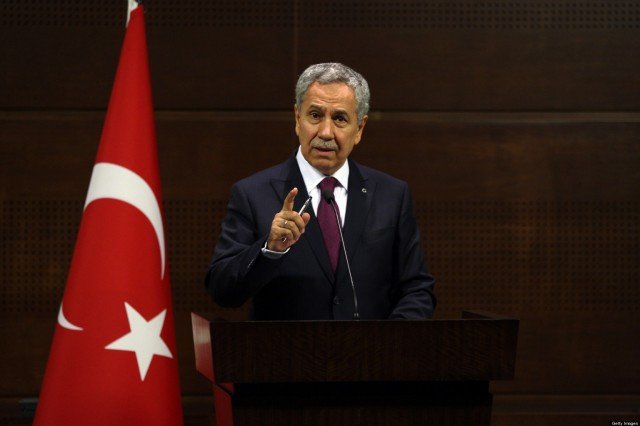
Deputy PM Bulent Arinc has apologized to protesters injured in demonstrations opposing the demolition of Gezi Park
Hundreds of protesters were reported to have gathered in the early hours of Tuesday in Ankara where they were police used more tear gas and water cannon.
Share values in Turkey were hit badly by the unrest on Monday, with the main share index falling by 10.47%, although it did recover some of the losses in early trading on Tuesday.
In a sign of continuing concern in Washington, US Secretary of State John Kerry spoke of “excessive use of force” by the police.
“We obviously hope that there will be a full investigation of those incidents and full restraint from the police force,” he said.
The protests began on May 28 over plans to redevelop Gezi Park near Taksim Square in Istanbul.
They soon mushroomed, engulfing several cities and including political demands.
Unrest was also reported on Sunday in the western coastal city of Izmir, Adana in the south and Gaziantep in the south-east.
Protesters accuse the Turkish government of becoming increasingly authoritarian.
They fear Recep Tayyip Erdogan’s Justice and Development Party (AKP) is trying to impose conservative Islamic values on the officially secular country and infringe on their personal freedoms, correspondents say.
His opponents see moves such as recent restrictions on the sale of alcohol and legislation last year which allowed children to enter Islamic schools at a younger age as proof of this agenda.
An investigation into hundreds of coup plot suspects has also been seen as undermining the influence of the military, which has traditionally considered itself as guarantor of the country’s secular constitution.
However, supporters of Recep Tayyip Erdogan point to the fact that he has been elected with a convincing majority, and that many Turks still back him.
Gezi Park:
- The demolition of Gezi Park – the issue which sparked Turkey protests – is a part of a wider urban redevelopment project in Istanbul
- The government wants to pedestrianise and ease traffic around Taksim Square; Kalyon Group, a company which has close ties with the government, has been contracted to carry out the project
- The project also includes building a shopping centre which PM Recep Tayyip Erdogan says would not be “a traditional mall”, but rather would include cultural centres, an opera house and a mosque
- The plan also includes rebuilding an Ottoman-era military barracks near the site and demolishing the historic Ataturk Cultural Centre
- The government has been making ambiguous and inconsistent statements about the project, which is causing concern among protesters who oppose replacing the green city park with grey concrete
[youtube tIpoynnNKhg]
[youtube gxq3_2xamD4]
Prime Minister Recep Tayyip Erdogan says the continuing anti-government protests in Istanbul and across the country do not constitute a “Turkish Spring”.
At a news conference before a trip to Morocco, Recep Tayyip Erdogan said the protests were organised by extremists and accused the opposition of provoking “his citizens”.
For a fourth night, there have been confrontations between police and protesters with tear gas being used.
A protester has died after being hit by a taxi on Sunday, doctors say – the first fatality since the unrest began.
The demonstrator, 20-year-old Mehmet Ayvalitas, was hit when the car ignored warnings to stop and ploughed into a crowd of protestors in the Mayis district of Istanbul, said the Turkish Doctors’ Union.
On Monday evening, thousands of demonstrators again gathered in Taksim Square, the focus of the recent protests.
A helicopter, its searchlight shining onto the crowd, hovered overhead and tear gas wafted into the square.
Many protesters shouted “Tayyip, resign!” while waving red flags and banners and blowing whistles, according to the AFP news agency.
Police also fired tear gas again to disperse protesters near Recep Tayyip Erdogan’s office in the Besiktas district of Istanbul.
Earlier on Monday, protesters clashed with police in the capital, Ankara. Tear gas and water cannon were fired at hundreds of demonstrators in the city as around 1,000 protesters converged on central Kizilay Square.
In another development, a public sector trade union confederation, Kesk, says it will begin a two-day strike starting on Tuesday in support.
The left-wing confederation accused the government of being anti-democratic and carrying out “state terror”.
Shares in Turkey fell sharply as fears that the protests could continue took hold, with the main share index falling by 10.47%. The cost of insuring Turkish debt rose to a two-month high.
In a sign of continuing concern in Washington, Secretary of State John Kerry spoke of “excessive use of force” by the police.

PM Recep Tayyip Erdogan says the continuing anti-government protests in Turkey do not constitute a Turkish Spring
“We obviously hope that there will be a full investigation of those incidents and full restraint from the police force,” he said.
Recep Tayyip Erdogan said during a televised news conference: “There are those attending these events organized by extremists. This is not about Gezi Park anymore. These are organized events with affiliations both within Turkey and abroad.
“The main opposition party CHP has provoked my innocent citizens. Those who make news [and] call these events the Turkish Spring do not know Turkey.”
Meanwhile, Turkish President Abdullah Gul urged calm and defended protesters’ rights to hold peaceful demonstrations.
“If there are different opinions, different situations, different points of view and dissent, there is nothing more natural that being able to voice those differences,” he was quoted as saying by the Anatolia news agency.
“The messages delivered with good intentions have been received.”
Protesters say the Turkish government is becoming increasingly authoritarian.
They fear Recep Tayyip Erdogan’s Justice and Development Party (AKP) is trying to impose conservative Islamic values on the officially secular country and infringe on their personal freedoms, correspondents say.
Officials say more than 1,700 people have been arrested in demonstrations in 67 towns and cities, though many have since been released.
On Sunday night, protesters in Besiktas tore up paving stones to build barricades, and Istanbul police responded with tear gas and water cannon.
Mosques, shops and a university in Besiktas were turned into makeshift hospitals for those injured in the demonstration.
Several thousand people took part in the protest outside the recently decommissioned Besiktas football stadium.
Unrest was also reported on Sunday in the western coastal city of Izmir, Adana in the south and Gaziantep in the south-east.
Last week, the government passed legislation curbing the sale and advertising of alcoholic drinks.
The protests began on a small scale last week in opposition to plans to redevelop Gezi Park in Istanbul but have since taken on wider political demands.
The demonstrators say the park is one of the few green spaces in Istanbul, and object to the loss of public space for commercial purposes.
[youtube 2pEOQi73aN8]
Sumandef Hakkinda describes what happens in Turkey these days and writes on what’s behind protests – and how Turkish media are refusing to report it.
To my friends who live outside of Turkey: I am writing to let you know what is going on in Istanbul for the last five days. I personally have to write this because most of the media sources are shut down by the government and word of mouth and the internet are the only ways left for us to explain ourselves and call for help and support.
Four days ago a group of people who did not belong to any specific organization or ideology got together in Istanbul’s Gezi Park. Among them there were many of my friends and students. Their reason was simple: To prevent and protest the upcoming demolishing of the park for the sake of building yet another shopping mall at very center of the city. There are numerous shopping malls in Istanbul, at least one in every neighborhood! The tearing down of the trees was supposed to begin early Thursday morning. People went to the park with their blankets, books and children. They put their tents down and spent the night under the trees. Early in the morning when the bulldozers started to pull the hundred-year-old trees out of the ground, they stood up against them to stop the operation.
They did nothing other than standing in front of the machines. No newspaper, no television channel was there to report the protest. It was a complete media blackout. But the police arrived with water cannon vehicles and pepper spray. They chased the crowds out of the park.
In the evening the number of protesters multiplied. So did the number of police forces around the park. Meanwhile the local government of Istanbul shut down all the ways leading up to Taksim Square, where Gezi Park is located. The metro was shut down, ferries were cancelled, roads were blocked. Yet more and more people made their way up to the center of the city by walking.
They came from all around Istanbul. They came from all different backgrounds, different ideologies, different religions. They all gathered to prevent the demolition of something bigger than the park: The right to live as honorable citizens of this country.
They gathered and marched. Police chased them with pepper spray and tear gas and drove their tanks over people who offered the police food in return. Two young people were run over by the tanks and were killed. Another young woman, a friend of mine, was hit in the head by one of the incoming tear gas canisters. The police were shooting them straight into the crowd. After a three hour operation she is still in the Intensive Care Unit and in a very critical condition. As I write this we don’t know if she is going to make it. This blog is dedicated to her.
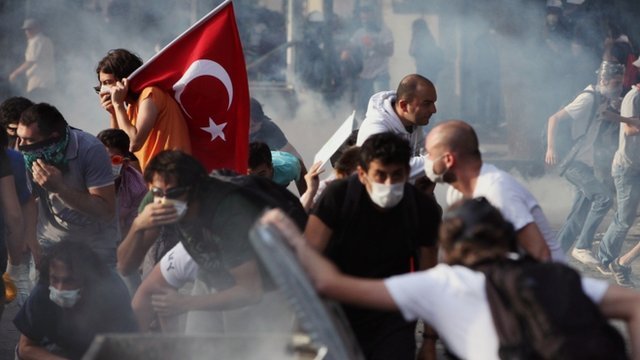
Istanbul protests June 2013
These people are my friends. They are my students, my relatives. They have no ‘hidden agenda’, as the state likes to say. Their agenda is out there. It is very clear. The whole country is being sold to corporations by the government, for the construction of malls, luxury condominiums, freeways, dams and nuclear plants. The government is looking for (and creating when necessary) any excuse to attack Syria against its people’s will.
On top of all that, the government’s control over its people’s personal lives has become unbearable as of late. The state, under its conservative agenda, passed many laws and regulations concerning abortion, cesarean birth, sale and use of alcohol and even the colour of lipstick worn by the airline stewardesses.
People who are marching to the center of Istanbul are demanding their right to live freely and receive justice, protection and respect from the state. They demand to be involved in the decision-making processes about the city they live in. What they have received instead is excessive force and enormous amounts of tear gas shot straight into their faces. Three people lost their eyes.
Yet they still march. Hundred of thousands join them. A couple of thousand more passed the Bosporus Bridge on foot to support the people of Taksim.
No newspaper or TV channel was there to report the events. They were busy with broadcasting news about Miss Turkey and ‘the strangest cat in the world’.
Police kept chasing people and spraying them with pepper spray to an extent that stray dogs and cats were poisoned and died by it.
Schools, hospitals and even 5 star hotels around Taksim Square opened their doors to the injured. Doctors filled the classrooms and hotel rooms to provide first aid. Some police officers refused to spray innocent people with tear gas and quit their jobs. Around the square they placed jammers to prevent internet connection and 3G networks were blocked. Residents and businesses in the area provided free wireless networks for the people on the streets. Restaurants offered food and water for free.
People in Ankara and Izmir gathered on the streets to support the resistance in Istanbul. Mainstream media kept showing Miss Turkey and ‘the strangest cat in the world’.
I am writing this letter so that you know what is going on in Istanbul. Mass media will not tell you any of this. Not in my country at least. Please post as many articles as you see on the Internet and spread the word.
As I was posting articles that explained what is happening in Istanbul on my Facebook page last night someone asked me the following question: ‘What are you hoping to gain by complaining about our country to foreigners?’ This blog is my answer to her.
By so called ‘complaining’ about my country I am hoping to gain:
Freedom of expression and speech,
Respect for human rights,
Control over the decisions I make concerning my on my body,
The right to legally congregate in any part of the city without being considered a terrorist.
But most of all by spreading the word to you, my friends who live in other parts of the world, I am hoping to get your awareness, support and help!
Please spread the word and share this blog. Thank you!
This blog post is republished from defnesumanblogs.com.
[youtube Qu9Eh-LjLLk]
Tens of thousands of Turks have staged a third day of protests across the country with police again using tear gas and water cannon in some areas, including in Istanbul, where crowds had converged on the prime minister’s office.
The protests were sparked by plans to build on Istanbul Gezi Park but have broadened into anti-government unrest.
Prime Minister Recep Tayyip Erdogan says the protesters are undemocratic, and said the development will go ahead.
He has accused opposition parties of provoking the demonstrations, which represents the most sustained anti-government unrest for a number of years.
Interior Minister Muammer Guler told state media more than 1,700 people had been arrested during protests in 67 cities, though many had since been released.
Hundreds of people are reported to have been injured in the clashes.
Protests over the demolition of Gezi Park to make way for the rebuilding of an Ottoman era barracks, reportedly to house a shopping centre, began on a small scale earlier this week.
Protesters said the park was one of the few green spaces in Istanbul, and were angry at the loss of public space for commercial purposes.
But after police used tear gas and water cannon were used to break up the protests, triggering accusations of excessive force, the numbers in Taksim Square, next to the park, rocketed.
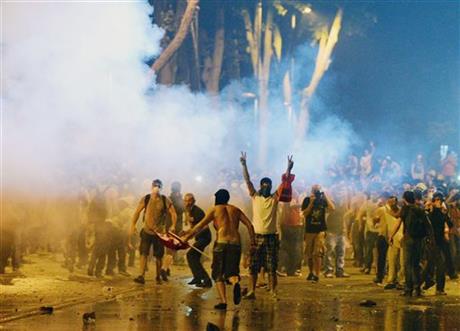
Clashes break out near PM Recep Tayyip Erdogan’s office
Ten of thousands of people took to the streets of towns and cities, many calling on the government to resign.
Police pulled out on Saturday afternoon, reportedly after President Abdullah Gul urged restraint, and by Sunday there was a carnival atmosphere.
But clashes continued, including in the Besiktas district, where police fired tear gas against protesters, some of whom built barricades or threw stones at Recep Tayyip Erdogan’s Istanbul office.
In Ankara, police fired tear gas at thousands of protesters who were attempting to march on the prime minister’s office there.
There were further reports of tear gas in Izmir, on the Aegean coast, and in Adana in the south.
The protests reflect the public’s anger with the Turkish government, which they believe is becoming increasingly authoritarian.
They fear Recep Tayyip Erdogan’s Justice and Development Party (AKP) is trying to impose conservative Islamic values on the officially secular country and infringe on their personal freedoms.
Last week the government quickly passed legislation curbing the sale and advertising of alcoholic drinks, which analysts say alarmed secularists.
Many felt insulted when he defended the legislation by calling people who drink “alcoholics”.
In a televised interview on Sunday, Recep Tayyip Erdogan, in power since 2002, denied accusations of being a dictator, saying he was “a servant of the people”.
He said the protests were being provoked by the opposition Republican People’s Party (CHP), and that those taking part were trying to undermine democracy, dismissing them as “a few looters”.
Recep Tayyip Erdogan also criticized social media, through which the protests have been co-ordinated and discussed, calling Twitter a “curse” and an “extreme version of lying”.
The crackdown has been condemned by rights groups and by the US.
[youtube SDkobEMA5z0]
[youtube Qu9Eh-LjLLk]









